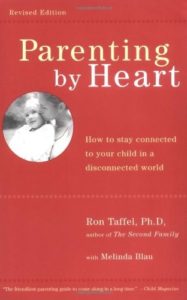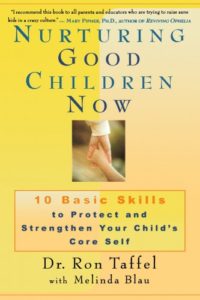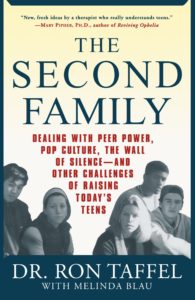Family therapist Ron Taffel, PhD, chair of the Institute for Contemporary Psychotherapy in New York City, is one of the smartest clinicians and most compassionate men I know. We collaborated on three parenting books, chock full of Ron’s cases and out-of-the-box ideas. These many years later, our books are more relevant than ever.

Parenting By Heart: How to Stay Connected to Your Child in a Disconnected World
This book not only debunks widely held myths about parenting, it makes important points about child and adult development. Different ages require different styles of parenting. As your children’s needs change, you must change, too, shifting from “Parent Protector,” a role well-suited to parenting young kids to “Parent Chum” when your children are in middle school and then to “Parent Realist” as they inch toward adolescence. Each chapter contradicts conventional wisdom–for example, about “in-charge parents,” “over-involved mothers and under-involved fathers,” and the need for “consistency”–and helps you understand how these ideas became accepted as truths. The good news is that you don’t have to be held hostage by dated notions of parenting. As in all our books, Ron offers you concrete strategies for avoiding the pitfalls and improving the connection to your child.

Nurturing Good Children Now: 10 Basic Skills to Protect and Strengthen Your Child’s Core Self
Aimed at parents whose kids range approximately from three to ten, this book is a guide to building a foundation of strong character in younger kids. Ron identifies ten essential traits that children (and, I dare say, people of all ages) need to thrive in today’s world: “mood mastery” (teaching them how to regulate and sooth themselves); “expressiveness” (helping them talk about what matters to them); “peer smarts” (guiding them socially, to make good friends and avoid destructive, hurtful ones); “respect” (inspiring them to listen to responsible adults); “focus” (getting them to slow down and pay attention even in the face of distractions); “body comfort” (encouraging them to see their looks in a positive light, even if they culture teaches them not to); “team intelligence” (helping them understand and work well in collaboration and within groups); “passion” (fostering their natural love of learning and self-driven interests), and “gratitude” (help them appreciate). These are not always easy traits to nurture; the culture works against parents. But child development research and Ron’s practical advice makes it is possible to nurture good children now.

The Second Family: Dealing with Peer Power, Pop Culture, the Wall of Silence — and Other Challenges of Raising Today’s Teens
Ron calls the unprecedented collective power of the peer group and pop culture “the second family”— a force so pervasive it often overwhelms the first family of adults at home and in school. Derived from thousands of conversations with kids and adults, this book uses real-life examples to shatter the myths: Peer pressure, as we once thought of it, is dead. Kids don’t make each other do things just to conform; they live and let live. They don’t necessarily stop talking to parents. Rather, parents don’t know how to listen. As a result, many teens help each other through everyday dilemmas and problems. However, kids still need parents who can help with their complicated lives. Beyond laying out the problems and challenges, this book also illuminates the positive aspects of the second family: a secret moral code of peer support, boys and girls as best friends (without benefits), boys emotionally care-taking those in need, girls as powerful group leaders. The concrete strategies in The Second Family will help you strike a balance between empathy and expectations and, most important, prevent your growing child from entirely slipping away.